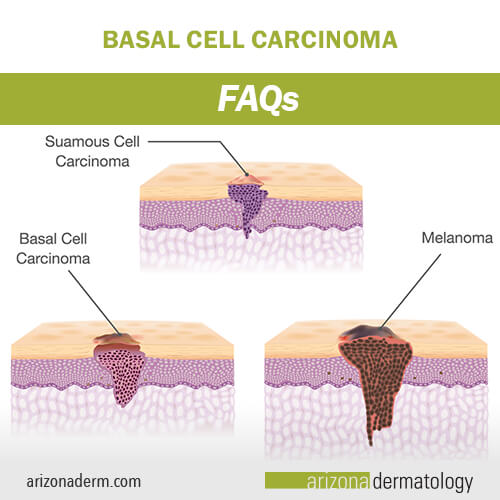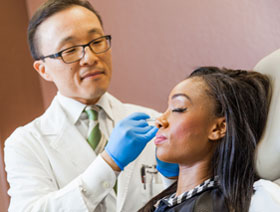 They are the most common type of skin cancer, so let’s talk about basal cell carcinomas. From what they are to treatment options and beyond, here are the top questions our dermatologists receive.
They are the most common type of skin cancer, so let’s talk about basal cell carcinomas. From what they are to treatment options and beyond, here are the top questions our dermatologists receive.
What is a Basal Cell Carcinoma?
A basal cell carcinoma is a form of skin cancer that occurs when the basal cells of the skin grow out of control. Basal cell carcinomas (also called BCCs) are slow-growing and very curable. When caught early, they cause minimal damage.
What Does a Basal Cell Carcinoma Look Like?
Basal cell carcinomas can look very different from one person to another. They may appear as:
- An open sore
- Red patch
- Elevated growth with rolled edges and a central indentation
- A shiny bump
- A scar
- A brown lesion (in darker skin)
BCCs can itch, bleed, ooze or crust, but not all do. You can see photos of BCCs on the Skin Cancer Foundation’s BCC Warning Signs page. Because BCCs can be tricky to diagnose, it’s best to have any strange new growth checked out by a dermatologist!
Where Do Basal Cell Carcinomas Typically Occur?
Skin cancer can occur anywhere on the body. That said, basal cell carcinomas often show up in areas that have received a lot of sun exposure, most commonly the face, head and neck.
Who is at Risk for Basal Cell Carcinoma?
Anyone who has been exposed to UVB rays is at risk of developing BCCs. The people most at risk are those with a fair or freckled complexion, those who have a history of sunburn (especially blistering sunburn), people who work or spend a lot of time outdoors, and those who have already had a BCC.
Others who are at higher risk are people with compromised immune systems and those who have been exposed to radiation, coal tar, or arsenic. Also, BCCs take a while to develop, so the risk also goes up with age.
What Causes Basal Cell Carcinomas?
Most BCCs occur when ultraviolet radiation (from the sun or tanning beds) causes cellular damage to the basal cells of the epidermis. The cells begin to grow out of control.
Are Basal Cell Carcinomas Dangerous?
BCCs generally aren’t dangerous, especially if they are caught early and treated. BCCs grow slowly and rarely metastasize. That said, if left untreated, a BCC can grow large enough to be disfiguring, growing deep into the skin and invading nearby tissues, even bone. In very rare cases, an aggressive BCC can spread and become life-threatening.
Can Basal Cell Carcinomas Turn into Melanoma?
No. Basal cell carcinomas begin in the basal cells of the epidermis while melanoma develops in the melanocytes. The two forms of skin cancer are completely different.
Do I Need Mohs Surgery for a Basal Cell Carcinoma?
Your doctor may or may not recommend Mohs micrographic surgery to treat your basal cell carcinoma. Mohs surgery is an extremely precise surgical technique with a 99% cure rate, making it the gold standard in skin cancer surgery.
Other options to remove BCCs include electrosurgery, excision, cryosurgery, and laser surgery. Your doctor will discuss all of your options with you.
Is There a Nonsurgical Way to Treat a Basal Cell Carcinoma?
Your doctor may talk to you about other methods to remove a basal cell carcinoma on your face or in another cosmetically-sensitive area. Topical immunotherapy creams prompt your immune system to attack the cancer. Radiation therapy can also target BCCs. The benefit of these treatment options is that they cause less long-term scarring.
Will My Basal Cell Carcinoma Come Back?
Basal cell carcinomas can recur, especially if they are not treated with Mohs Surgery. Even if the treated lesion goes away, people who have had one BCC tend to develop more. Approximately 60 percent of people who have had a skin cancer will be diagnosed with a second one within 10 years, according to a 2015 study in JAMA Dermatology. If you’ve had two or more, you have a 61.5 percent chance of developing another within two years. Bottom line: keep up with your skin check appointments!
How Often Do I Need to Get a Skin Check After a Basal Cell Carcinoma?
For most people who have had a basal cell carcinoma, your doctor will want to see you every six to twelve months for a follow up skin check.
What Happens if I Don’t Have My Basal Cell Carcinoma Treated?
Left untreated, a BCC will continue to grow and may even become disfiguring. In rare cases it can spread and become dangerous. Basal cell carcinomas are easily treated and have a high cure rate. There is no reason to leave a BCC untreated. If you have fears or concerns, come and talk to one of our dermatologists, who can put your mind at ease and work with you on a treatment plan.
If I Had a Basal Cell Carcinoma, Am I At Risk for Melanoma?
Yes. People with a history of BCC are also at increased risk of developing other types of skin cancer, including squamous cell carcinoma (SCC) and melanoma. Be sure to keep up with your regular skin checks, use sunscreen, and wear protective clothing. These are all ways you can take charge of your health after a BCC diagnosis.


